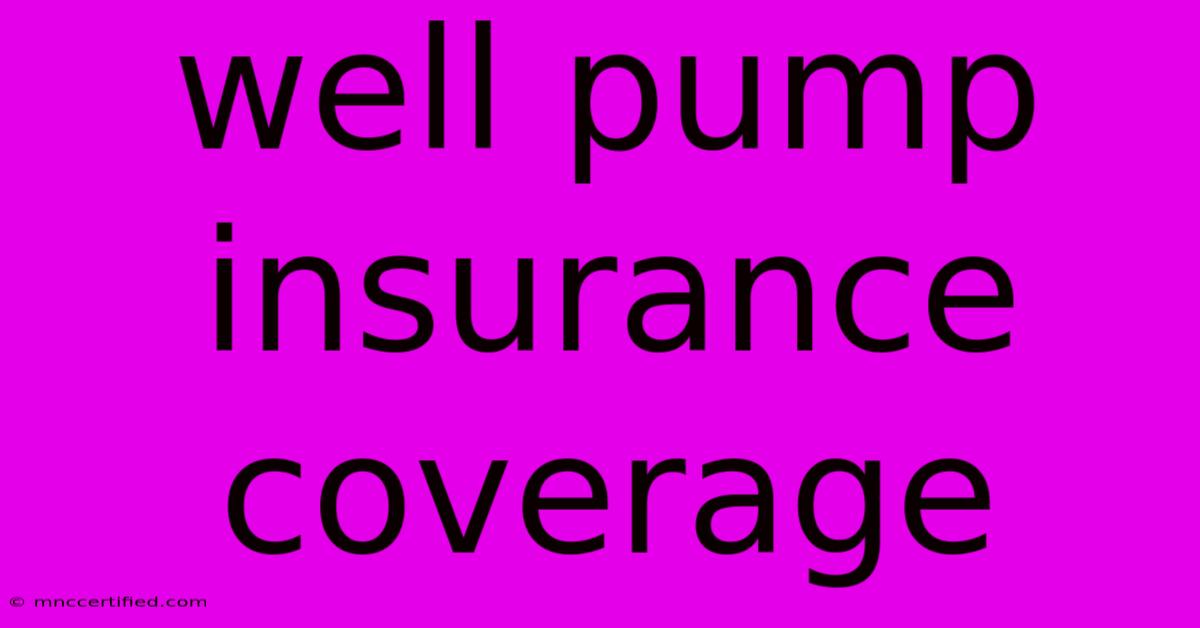Well Pump Insurance Coverage

Table of Contents
Well Pump Insurance Coverage: Protecting Your Water Supply
A well pump is a critical component of your home's infrastructure, providing essential access to clean water. When it fails, the consequences can be significant, ranging from inconvenience to substantial repair costs. This is why understanding well pump insurance coverage is crucial for homeowners relying on well water. This comprehensive guide will explore the intricacies of well pump insurance, helping you navigate the complexities and make informed decisions to protect your investment.
What Does Well Pump Insurance Typically Cover?
Well pump insurance, often a component of a homeowner's insurance policy or available as a separate rider, typically covers the costs associated with repairing or replacing your well pump due to unforeseen circumstances. This usually includes:
- Mechanical breakdowns: Coverage for malfunctions stemming from wear and tear, electrical surges, or other mechanical failures.
- Sudden and accidental damage: Protection against damage caused by events such as power surges, lightning strikes, or accidental impact.
- Well pump motor replacement: Costs related to replacing the motor, a frequently failing part of the well pump system.
- Parts and labor: Coverage for the necessary parts and the labor costs involved in repair or replacement.
Important Note: Specific coverage details vary significantly between insurance providers and policies. Always review your policy documents carefully to understand precisely what is and isn't covered.
What is Usually Not Covered?
While well pump insurance offers valuable protection, some issues are typically excluded. These may include:
- Gradual deterioration: Damage resulting from prolonged neglect or lack of regular maintenance.
- Pre-existing conditions: Problems present before the policy's effective date.
- Acts of God (sometimes): While some policies cover damage from events like flooding, others may exclude them. Check your policy carefully.
- Improper installation: Issues arising from faulty initial installation of the well pump.
How to Find Well Pump Insurance Coverage
Securing well pump insurance involves several steps:
-
Contact your current homeowner's insurance provider: Many insurers offer well pump coverage as an add-on to existing policies. Inquire about their options, premiums, and coverage limits.
-
Explore specialized well insurance companies: Several companies specialize in well and septic system insurance. These providers often offer comprehensive coverage tailored to these specific needs.
-
Compare quotes from multiple providers: Obtain quotes from various insurers to compare pricing, coverage, and policy terms. This ensures you're getting the best value for your money.
-
Carefully review policy details: Before committing to a policy, thoroughly review all the terms and conditions, paying close attention to exclusions and limitations.
The Importance of Regular Well Pump Maintenance
While insurance protects against unexpected failures, regular maintenance significantly reduces the likelihood of costly repairs. Regular maintenance can also impact your insurance premiums. Some insurers may offer discounts for homeowners who demonstrate proactive well maintenance. Consider these maintenance tasks:
- Annual inspections: A professional inspection can identify potential problems before they escalate.
- Regular cleaning: Removing sediment and debris keeps the pump running efficiently.
- Pressure tank checks: Ensuring the pressure tank is properly functioning prevents premature wear and tear.
Cost Considerations
The cost of well pump insurance varies depending on factors such as:
- Your location: Geographic factors can influence risk and, consequently, premiums.
- The age and condition of your well pump: Older pumps generally carry higher risk.
- Your deductible: A higher deductible typically results in lower premiums.
- Coverage limits: Higher coverage limits generally lead to higher premiums.
Don't underestimate the potential cost of a well pump failure. Repair or replacement can easily run into thousands of dollars. Weighing the cost of insurance against the potential repair expenses is crucial in determining its value.
Conclusion: Protecting Your Investment
Investing in well pump insurance is a prudent decision for homeowners who rely on a well for their water supply. While the cost of insurance is an expense, the financial protection it offers against unexpected and costly repairs far outweighs the risk of going without. By understanding the intricacies of well pump insurance coverage, comparing quotes, and practicing preventative maintenance, you can safeguard your water supply and your peace of mind. Remember to always read the fine print and ask questions to ensure you have the right coverage for your specific needs.

Thank you for visiting our website wich cover about Well Pump Insurance Coverage. We hope the information provided has been useful to you. Feel free to contact us if you have any questions or need further assistance. See you next time and dont miss to bookmark.
Featured Posts
-
Where To Watch England Vs Usa Game
Dec 01, 2024
-
Ncl Travel Insurance Reviews
Dec 01, 2024
-
Photos Tennessee Defeats Vanderbilt In Finale
Dec 01, 2024
-
Lakers News Christies Late Game Error
Dec 01, 2024
-
House Insurance Melbourne Fl
Dec 01, 2024